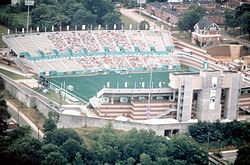Herndon Stadium
 From Wikipedia the free encyclopedia
From Wikipedia the free encyclopedia
Herndon Stadium | |
 | |
 | |
| Full name | Alonzo Herndon Stadium |
|---|---|
| Capacity | 15,011 |
| Field size | 68 yds wide × 110 yds long |
| Construction | |
| Built | 1948 |
| Opened | 1948 |
| Tenants | |
| Atlanta Beat (WUSA) (2002–2003) MBC Wolverines | |
Alonzo Herndon Stadium, named for Alonzo Herndon, is an abandoned 15,011-seat stadium on the campus of Morris Brown College in Atlanta, Georgia, United States. It is the only two-sided stadium in the Atlanta University Center. It is one block over from the locally known Herndon Home, and sits above the MARTA East-West rail line.
The stadium opened in 1948. It is the largest stadium at an institution in the Atlanta University Center, and the only with stands on both sides.[1]
In addition to sports, the stadium hosted concerts. Ray Charles recorded a live album at the stadium.[1]
During the 1996 Summer Olympics, Herndon Stadium hosted field hockey. It was expanded and renovated ahead of the games. The stadium was the home to the former Georgia Mustangs and the former Atlanta Beat women's soccer club of the WUSA league, the latter of whom played there from 2001 until 2003.[1]
Due to the college's financial hardships, the stadium was sold to the City of Atlanta in 2014.[2] Due to a land-use agreement with other members of the Atlanta University Center and historic property deeds, ownership of the stadium was given to Clark Atlanta University by court order. The school is planning to restore the stadium.[1]
As of 2024, the stadium sits in a state of disrepair, gutted by vandals and covered in graffiti and trash.[3] Because of this, it was used as the stand-in for the demolished Fairfield Stadium in Huntington, West Virginia during the filming of the 2006 movie We Are Marshall,[1][3] and also featured in the 2024 movie Civil War, standing in as a United Nations relief center.
References
[edit]- ^ a b c d e "Sites and Venues of '96 Stop 6 | Herndon Stadium, Morris Brown College". Atlanta History Center. Retrieved November 7, 2022.
- ^ "City loses costly land dispute to Clark Atlanta University". WSB-TV Channel 2 - Atlanta. April 28, 2018. Retrieved May 24, 2024.
- ^ a b "Atlanta's Olympic venues meet varying fates since 1996". USA Today. July 29, 2016. Retrieved July 13, 2019.
- 1996 Summer Olympics official report. Volume 1. p. 542.
- 1996 Summer Olympics official report. Volume 3. p. 458.
External links
[edit]Further reading
[edit]- Gaither, Steven J. (October 6, 2014). "A Shell of A Stadium: Morris Brown's Herndon Stadium Is An HBCU Football Graveyard". hbcugameday.com. Archived from the original on May 15, 2019. Retrieved February 25, 2017.
- "Abandoned: Morris Brown's Herndon Stadium". hbcugameday.com. May 18, 2016. Archived from the original on May 15, 2019. Retrieved February 25, 2017.
33°45′22″N 84°24′32″W / 33.756021°N 84.408807°W

